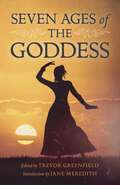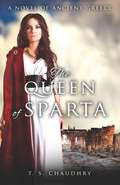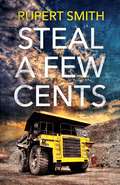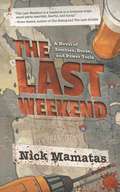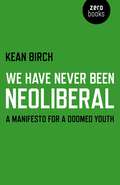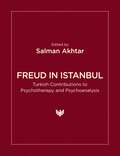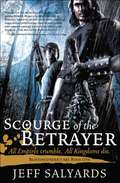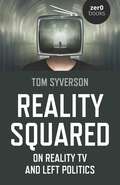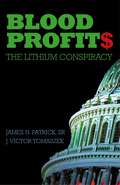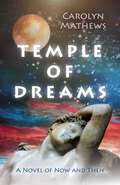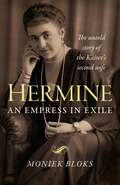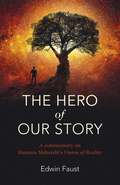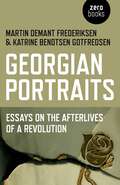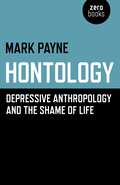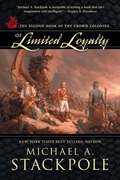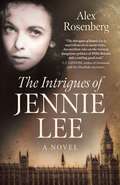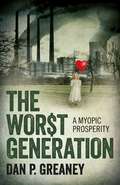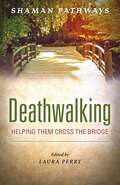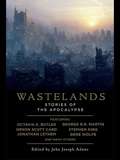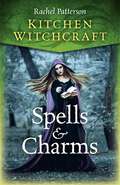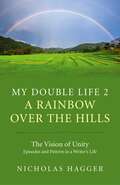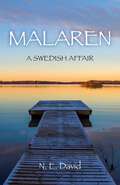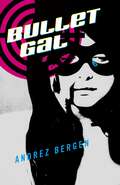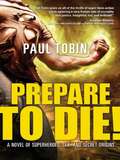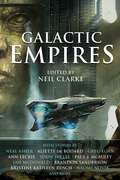- Table View
- List View
Seven Ages of the Goddess
by Trevor GreenfieldWith contributions from best-selling authors such as Morgan Daimler, Elen Sentier and Jhenah Telyndru, as well as a new generation of up-coming writers, Seven Ages of the Goddess uncovers the history of the Goddess, from prehistoric origins through to the present day and beyond. Edited by Trevor Greenfield, publisher of Moon Books and editor of Naming the Goddess and Goddess in America.
The Queen of Sparta: A Novel of Ancient Greece
by T. S. ChaudhryXerxes, the Great King of Persia invades Greece in 480 B.C. at the head of a massive army. Three hundred Spartans and King Leonidas die heroically blocking the Persian advance at the pass of Thermopylae. The Persians are poised to conquer all of Greece. The only one standing in their way is a woman – Gorgo, Queen of Sparta. Though history has relegated her role to that of a bystander, what if she played a central role in the Greek resistance to the Persian invasion. What if she kept her true role a secret in order to play it more effectively? What if she was hiding other secrets too – dark secrets of murder and vengeance? What if the only person who truly appreciated her genius was an enemy prisoner whom she has vowed to kill? What if after their victory, the Greeks started to turn on each other? What if, eventually, Gorgo had to choose between the security of Sparta and safety of her son? And what if the only one who could find a way out is the same prisoner who had once fought against the Spartans?
Steal a Few Cents
by Rupert SmithMpho Mamela, a young accountant at a coal mine in the Middelburg coalfields of South Africa is killed one night when he gets caught in the rollers of a conveyor belt. He is mangled beyond recognition. There will be an official State enquiry into his death, by the Inspectorate of Mining. Stephen Wakefield, the in-house lawyer and a director of the company, begins preparing for the enquiry, but he struggles to understand what happened - Mamela should not have been anywhere near the place he was killed. Bit by bit, Stephen&’s investigation uncovers a story far removed from a simple workplace accident. A web of deception and massive fraud is unveiled; fraud perpetrated by a person who publicly insists on high standards of morality and honesty. It becomes clear to Stephen that Mamela had tried to blackmail the guilty party to help his lover, who is in prison for attempting to steal a trifling amount from the mining company. When the killer learns that his actions are about to be exposed, Stephen realises that his own life is now in danger...
The Last Weekend
by Nick MamatasVasilis &“Billy&” Kostopolos is a Bay Area Rust Belt refugee, failed sci-fi writer, successful barfly and, since the exceptionally American zombie apocalypse, an accomplished &“driller&” of reanimated corpses. There aren&’t many sane, well-adjusted human beings left in San Francisco, but facing the end of the world, Billy&’s found his vocation trepanning the undead, peddling his one and only published short story, and drinking himself to death.Things don&’t stay static for long. Billy discovers that both his girlfriends turn out to be homicidal revolutionaries. He collides with a gang of Berkeley scientists gone berserker. Finally, the long-awaited &“Big One&” shakes the foundation of San Francisco to its core, and the crumbled remains of City Hall can no longer hide the awful secret lurking deep in the basement. Can Billy unearth the truth behind America&’s demise and San Francisco&’s survival—and will he destroy what little&’s left of it in the process? Is he legend, the last man, or just another sucker on the vine?Nick Mamatas takes a high-powered drill to the lurching, groaning conventions of zombie dystopias and conspiracy thrillers, sparing no cliché about tortured artists, alcoholic &“genius,&” noir action heroes, survivalist dogma, or starry-eyed California dreaming. Starting in booze-soaked but very clear-eyed cynicism and ending in gloriously uncozy catastrophe, The Last Weekend is merciless, uncomfortably perceptive, and bleakly hilarious.
We Have Never Been Neoliberal: A Manifesto for a Doomed Youth
by Kean BirchA number of people have claimed that the ongoing financial crisis has revealed the problems with neoliberal thought and neoliberal policies in the 'Atlantic Heartland'. However, if we look at the history of the 'Heartland' economies then it becomes evident that they were never neoliberal in the first place - that is, the economic policies and discourses in these countries did not follow neoliberal prescriptions. /We Have Never Been Neoliberal/ explores this divergence between neoliberal theory and 'neoliberal' practice by focusing on the underlying contradictions in monetarism, private monopolies, and financialization. The book finishes by proposing a 'manifesto for a doomed youth' in which it argues that younger generations should refuse to pay interest on anything in order to avoid the trap of debt-driven living.
Freud in Istanbul: Turkish Contributions to Psychotherapy and Psychoanalysis
by Salman AkhtarWith contributions from Salman Akhtar, Muge Alkan, Gulgun Alptekin, Mine Ozguroglu Cukurcesme, Yavuz Erten, Cemile Serin Gurdal, Elif Nisan Ilkmen, Ulku Elif Gurisik, Bella Habip, Cuneyt Iscan, Sureyya Iscan, T. Byram Karasu, M. Sagman Kayatekin, Z. Emel Kayatekin, Pinar Limnili Ozeren, Talat Parman, Kutlughan Soyubol, Duygu Tekgul-Akin, Isil Vahip, Vamik D. Volkan, and Ayla Yazici. The book is divided into four parts. The first looks at the history of psychoanalysis in Turkey. The second investigates the psychology of mothers, fathers, siblings, and the adolescent phase in Turkey. The third addresses the complexities and nuances of identity formation, nostalgic rumination, massive trauma, and female aggression in the context of Turkish society at large, including the use of film and literature. The fourth pertains to technical clinical issues, dealing with matters as diverse as grief, spirituality in the context of psychotherapy and psychoanalysis, tenacious maternal transferences and the handling of nonverbal material in the clinical session, to name but a few. While the book is psychoanalytic, not all contributors are analysts; many belong to other fields including psychology, sociology, psychiatry, and cultural anthropology. Thus, this is a book not only for psychoanalysts, but also for members of those fields, psychotherapists, and anyone with an interest in Turkish culture.
Scourge of the Betrayer (Bloodsounder's Arc)
by Jeff SalyardsMany tales are told of the Syldoon Empire and its fearsome soldiers, who are known throughout the world for their treachery and atrocities. Some say that the Syldoon eat virgins and babies–or perhaps their own mothers. Arkamondos, a bookish young scribe, suspects that the Syldoon&’s dire reputation may have grown in the retelling, but he&’s about to find out for himself.Hired to chronicle the exploits of a band of rugged Syldoon warriors, Arki finds himself both frightened and fascinated by the men&’s enigmatic leader, Captain Braylar Killcoin. A secretive, mercurial figure haunted by the memories of those he&’s killed with his deadly flail, Braylar has already disposed of at least one impertinent scribe . . . and Arki might be next.Archiving the mundane doings of millers and merchants was tedious, but at least it was safe. As Arki heads off on a mysterious mission into parts unknown, in the company of the coarse, bloody-minded Syldoon, he is promised a chance to finally record an historic adventure well worth the telling, but first he must survive the experience!A gripping military fantasy in the tradition of Glen Cook, Scourge of the Betrayer explores the brutal politics of Empire–and the searing impact of violence and dark magic on a man&’s soul.
Reality Squared: On Reality TV and Left Politics
by Tom SyversonIn this concise but rich book, Syverson refutes the common notion that reality television is superficial or inauthentic, explaining how such criticisms fail to appreciate the way that we form social reality in the first place. By examining shows like The Hills, The Real Housewives, Vanderpump Rules, and The Bachelor alongside postmodern philosophy, feminist theory, and political economy, Syverson argues that we can confront today&’s postmodern condition only by accepting it on its own terms. To what extent does reality television mimic and shape our public and personal lives? Is reality television a dangerous, shallow decadence, or can it provide the key to understanding our postmodern moment? And above all, what does the election of Donald Trump mean for progressive fans of the genre? Reality Squared tackles these questions head-on, arguing that reality television represents the great modern art form, and the only entertainment vehicle capable of showing what it feels like to be alive today.
Blood Profit$: The Lithium Conspiracy
by J. Victor Tomaszek James N. PatrickThe very soul of a nation is threatened as three once naive Americans risk the ultimate sacrifice to uncover and expose a global conspiracy to defraud America of trillions funded by Washington war profiteering and illegal drug sales sanctioned by the CIA, controlled by the Mafia and laundered by Wall Street traders. Blood Profit$ will take you into the cigar smoke-filled room where American policy and laws are really made...
Temple of Dreams: A Novel Of Now And Then
by Carolyn MathewsHomeless and jobless following the death of his adoptive parents, Sebastian enrols at a college of natural medicine which boasts a sanctuary modelled on an ancient Greek healing centre. After a night in the temple, he dreams of Apollos, a young Athenian defeated in a pankration contest, suffering memory loss. More dreams follow, decrypted by Sybil, the lecturer who insists he keeps a dream journal. Seb is kept busy in the 21st century by a budding relationship with Fliss, which stalls when she tries to persuade him to search for his birth parents. Meanwhile, Apollos, in the fifth century BC, readies himself to attend the festival of the Greater Eleusinian Mysteries, to discover the secrets of how to avoid the perils of the underworld and make it to Elysium.
Hermine: The Untold Story of the Kaiser's Second Wife
by Moniek BloksHermine Reuss of Greiz is perhaps better known as the second wife of the Kaiser (Emperor Wilhelm II of Germany) whom she married shortly after the death of his first wife Auguste Viktoria and while he was in exile in the Netherlands. She was by then a widow herself with young children. She was known to be ambitious about wanting to return to power, and her husband insisted on her being called 'Empress'. To achieve her goal, she turned to the most powerful man in Germany at the time, Adolf Hitler. Unfortunately, her dream was not realised as Hitler refused to restore the monarchy and with the death of Wilhelm in 1941, Hermine was forced to return to her first husband's lands. She was arrested shortly after the end of the Second World War and would die under mysterious circumstances while under house arrest by the Red Army.
The Hero of Our Story: A Commentary on Ramana Maharshi's "Vision of Reality"
by Edwin FaustWhen we know who we truly are, rather than who we take ourselves to be, we will realize that we are indeed the hero of our story and that we need not look to others or the world to find our heart's desire. The Hero of Our Story is intended to be a simple and accessible entry point for those interested in Ramana and the teachings of Vedanta -- one of the six schools of Hindu philosophy. A commentary on Ramana's Sat Darshanam, each of the 42 verses from the text is presented and followed by commentary and discussion by the author.
Georgian Portraits: Essays on the Afterlives of a Revolution
by Martin Demant Frederiksen Katrine Bendtsen GotfredsenGeorgian Portraits chronicles everyday life in the Republic of Georgia in the decade that followed the Rose Revolution of 2003. Recent anthropological developments argue for the use of &“afterlives&” as an analytical notion through which to understand processes of socio-political change. Based on a series of portraits, Martin Demant Frederiksen and Katrine Bendtsen Gotfredsen employ the theory of social afterlives to examine the role of revolution in the formation of a modern Georgia. The book contributes to a deeper understanding of life in the aftermath of political reform, depicting the hopefulness of the Georgian population, but also the subsequent return to political disillusionment which lead them to a revolution in the first place.
Hontology: Depressive Anthropology and the Shame of Life
by Mark PayneJacques Derrida&’s Specters of Marx has had an enormous influence on recent thought about the fate of human capabilities in late capitalism, especially in Europe. Hontology explores a road not taken in Specters of Marx - the idea that shame is the route by which we access the capabilities for living that are abrogated in modernity. More particularly still, the book considers the loss of the New World as an horizon in which these abrogated capabilities were still in play, and the inhabitants of the New World as presenting forms of life before which Europeans felt shame in comparison with their own. Finally, the book discusses what might take the place of the New World now that its productive horizon of shame has receded from view.
Of Limited Loyalty
by Michael Stakpole1767. In the three years since defeating the Tharyngians at Anvil Lake, The Crown Colonies of Mystria have prospered. Colonists, whether hunting for new land or the Promised Land of prophecy, have pushed beyond the bounds of charters granted by the Queen of Norisle. Some of these new communities have even had the temerity to tell the Crown they are no longer subject to its authorities. To survey the full extent of the western expansion, the Crown has sent Colonel Ian Rathfield to join Nathaniel Woods, Owen Strake, and Kamiskwa on an expedition into the Mystrian interior. They discover a land full of isolated and unique communities, each shaped in accord with the ideals of the founders. Conflicts abound among them, and old enemies show up at the least useful moments. Worse yet, lurking out there is a menace which the Twilight People only know from folklore as the Antedeluvians; and westward penetration stumbles into their lands and awakens them. Alerted to this threat by his men, Prince Vlad petitions the Crown to send troops and supplies to destroy this new and terrifying enemy. The Crown refuses, citing massive debts from the last war. They dismiss Vlad's claims as fantasy, and impose a series of taxes on Mystrian trade to finance their own recovery. Faced with fighting an inhuman foe in a land seething with resentment against the Crown, Vlad must unite the Colonies in a common cause, or preside over their complete destruction.
Intrigues of Jennie Lee: A Novel
by Alex RosenbergA gripping and evocative story of love, politics, betrayal and bravery, which reimagines events of the interwar years. Jennie Lee was elected to parliament aged just twenty-four, five years too young even to vote in 1929 Britain. From the Labour backbenches, she hurled barbs and bolts of thunder at the likes of Winston Churchill, Lady Astor, even her own party&’s Prime Minister, Ramsay McDonald. The novel intertwines real events with a personal story involving Elizabeth Bowes-Lyons, the future Queen Mother; the womanizing fascist Oswald Mosley; the Great War prime minister Lloyd-George; and the radical Labour MP Aneurin Bevan. A series of political and intimate intrigues turn history into thriller when Jennie has the chance to radically change the course of history for Britain, Europe and the world. '...marvellous in so many ways… An excellent take on the twisted, dangerous politics of 1930s Britain and a rattling good read.' C.J. Sansom, author of Dominion and the Shardlake mysteries
The Worst Generation: A Myopic Prosperity
by Dan P. GreaneyThe Worst Generation is character Jenny Alhouse&’s indictment of her parents&’ contributions to the contemporary world, their generational short-sighted and selfish degradation of economic and environmental well-being. Her recounting of childhood shows much she is thankful for - a stable, caring home, times kayaking with her father, family trips, a quality education, the benefits of prosperity. But she tells the story from her adulthood, and includes the things she could not see as a child: the economic and environmental plundering and inconsideration imbedded in her upbringing that leave her world unstable, uncivil, and unsafe.
Shaman Pathways - Deathwalking: Helping Them Cross the Bridge
by Laura PerryDeathwalking, or psychopomping, is the shamanic practice of helping the deceased's soul pass on to the next realm. Despite being an essential aspect of the Shaman&’s historic and contemporary role, it has been largely overlooked in modern Shamanic literature. Shaman Pathways – Deathwalking is an anthology offering ten perspectives on this vital and timeless practice.
Wastelands
by John Joseph AdamsFamine, Death, War, and Pestilence: The Four Horsemen of the Apocalypse, the harbingers of Armageddon — these are our guides through the Wastelands... From the Book of Revelations to The Road Warrior; from A Canticle for Leibowitz to The Road, storytellers have long imagined the end of the world, weaving tales of catastrophe, chaos, and calamity. Gathering together the best post-apocalyptic literature of the last two decades from many of today&’s most renowned authors of speculative fiction, including George R.R. Martin, Gene Wolfe, Orson Scott Card, Carol Emshwiller, Jonathan Lethem, Octavia E. Butler, and Stephen King, Wastelands explores the scientific, psychological, and philosophical questions of what it means to remain human in the wake of Armageddon.
Kitchen Witchcraft: Spells & Charms
by Rachel PattersonThere are a lot of things in the universe that we don&’t understand. When something is meant to happen, it will whether you cast a spell or not. But you can help it on its way by guiding and encouraging it and maybe even tweaking events a little too. A spell can be worked in many ways, from a simple pointing of the finger to a complicated ritual involving lots of herbs and crystals and, of course, any variation in between. What will happen for sure is the boost of confidence and happy buzz you will receive as you cast the spell, as well as the positive vibe you get from putting something into action. Kitchen Witchcraft: Spells & Charms is a the first in a series of books which delves into the world of the Kitchen Witch. Each book breaks down the whys and wherefores of the subject and includes practical guides and exercises. Other titles include Garden Magic, Altars & Rituals and The Elements.
My Double Life 2
by Nicholas HaggerIn My Double Life 1 Nicholas Hagger told of his four years&’ service and double life as an undercover British intelligence agent during the Cold War (there revealed for the first time). Lost in a dark wood like Dante following his encounters with Gaddafi&’s Libya and the African liberation movements, he found Reality on a &‘Mystic Way&’ of loss, purgation and illumination, perceived the universe as a unity and had 16 experiences of the metaphysical Light. In My Double Life 2 he continues the story. He received new powers, coped with fresh ordeals, acquired three schools, renovated a historic house, and had 76 further experiences of the metaphysical Light. He founded a new philosophy of Universalism and new approaches to contemporary history, international statecraft and world literature. He produced nearly 1,500 poems, over 300 classical odes, five verse plays, two poetic epics, over a thousand short stories – and 40 books that include innovative literary, historical and philosophical works. His vision of Universalism in seven disciplines is like a rainbow with seven bands overarching seven hills. He produced nearly 1,500 poems, over 300 classical odes, five verse plays, two poetic epics, over a thousand short stories – and 40 books that include innovative literary, historical and philosophical works. His vision of Universalism in seven disciplines is like a rainbow with seven bands overarching seven hills.
Malaren: A Swedish Affair
by N. E. DavidAlan Harrison is a perfectly ordinary, middle-class, middle-aged and happily married man. But when his wife, Susan, suddenly dies, his life starts to disintegrate. Rather than stay at home where the memory of his wife still haunts him, he decides to spend the summer in Sweden at the invitation of his in-laws. On the shores of Lake Malaren, he discovers fresh reasons for living and a contentment he had not previously thought possible. But unexpected guests arrive to disturb his new-found peace and he is forced to take unprecedented steps to recover it. Set against a backdrop of stunning Swedish scenery, MALAREN shows us the redemptive power of physical labour and male bonding as an unlikely hero struggles to overcome his challenges.
Bullet Gal
by Andrez BergenTeenage gunsel-cum-aspiring-hero Mitzi (last name unknown) breezes into Heropa with twin 9 mm pistols blazing - only to be targeted for recruitment, betrayal and assassination. French femmes fatale, an out-of-touch super-powered elite, and one hell of an underlying mystery, figure heavily in this fusion neo-noir, science-fiction dystopia. Interweaving the scrappy one-liners is a story much more than the sum of its parts, concerning questions about grand creative process.
Prepare to Die!
by Paul TobinNine years ago, Steve Clarke was just a teenage boy in love with the girl of his dreams. Then a freak chemical spill transformed him into Reaver, the man whose super-powerful fists can literally take a year off a bad guy&’s life.Days ago, he found himself at the mercy of his arch-nemesis Octagon and a whole crew of fiendish super-villains, who gave him two weeks to settle his affairs–and prepare to die.Now, after years of extraordinary adventures and crushing tragedies, the world&’s greatest hero is returning to where it all began in search of the boy he once was . . . and the girl he never forgot.Exciting, scandalous, and ultimately moving, Prepare to Die! is a unique new look at the last days of a legend.
Galactic Empires
by Neil ClarkeNeil Clarke, publisher of the award-winning Clarkesworld magazine, presents a collection of thought-provoking and galaxy-spanning array of galactic short science fiction. From E. E. "Doc" Smith&’s Lensman, to George Lucas&’ Star Wars, the politics and process of Empire have been a major subject of science fiction&’s galaxy-spanning fictions. The idiom of the Galactic Empire allows science fiction writers to ask (and answer) questions that are shorn of contemporary political ideologies and allegiances. This simple narrative slight of hand allows readers and writers to see questions and answers from new and different perspectives. The stories in this book do just that. What social, political, and economic issues do the organizing structure of &“empire&” address? Often the size, shape, and fates of empires are determined not only by individuals, but by geography, natural forces, and technology. As the speed of travel and rates of effective communication increase, so too does the size and reach of an Imperial bureaucracy.Sic itur ad astra—&“Thus one journeys to the stars.&” At the beginning of the twentieth century, writers such as Kipling and Twain were at the forefront of these kinds of narrative observations, but as the century drew to a close, it was writers like Iain M. Banks who helped make science fiction relevant. That tradition continues today, with award-winning writers like Ann Leckie, whose 2013 debut novel Ancillary Justice hinges upon questions of imperialism and empire. Here then is a diverse collection of stories that asks the questions that science fiction asks best. Empire: How? Why? And to what effect? Table of Contents: - &“Winning Peace&” by Paul J. McAuley - &“Night&’s Slow Poison&” by Ann Leckie - &“All the Painted Stars&” by Gwendolyn Clare - &“Firstborn&” by Brandon Sanderson - &“Riding the Crocodile&” by Greg Egan - &“The Lost Princess Man&” by John Barnes - &“The Waiting Stars&” by Aliette de Bodard - &“Alien Archeology&” by Neal Asher - &“The Muse of Empires Lost&” by Paul Berger - &“Ghostweight&” by Yoon Ha Lee - &“A Cold Heart&” by Tobias S. Buckell - &“The Colonel Returns to the Stars&” by Robert Silverberg - &“The Impossibles&” by Kristine Kathryn Rusch - &“Utriusque Cosmi&” by Robert Charles Wilson - &“Section Seven&” by John G. Hemry - &“The Invisible Empire of Ascending Light&” by Ken Scholes - &“The Man with the Golden Balloon&” by Robert Reed - &“Looking Through Lace&” by Ruth Nestvold - &“A Letter from the Emperor&” by Steve Rasnic Tem - &“The Wayfarer&’s Advice&” by Melinda M. Snodgrass - &“Seven Years from Home&” by Naomi Novik - &“Verthandi&’s Ring&” by Ian McDonald
